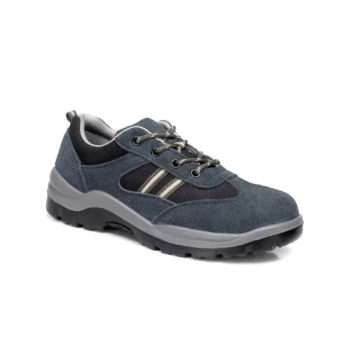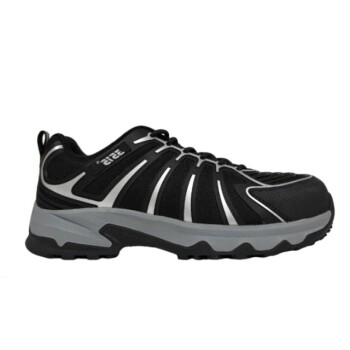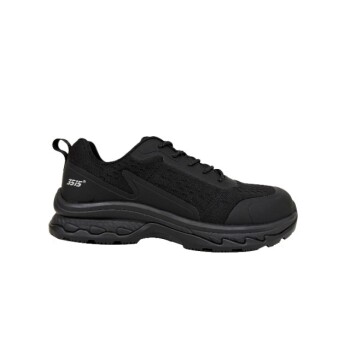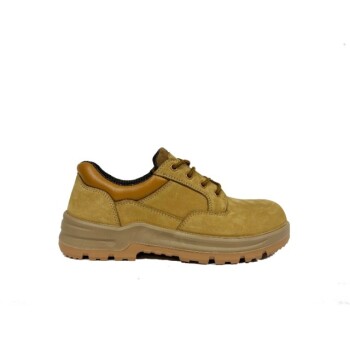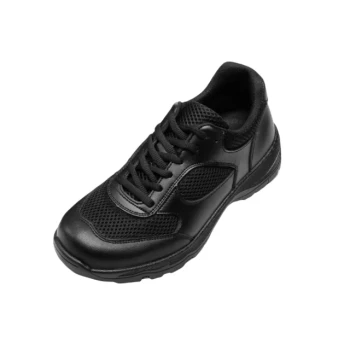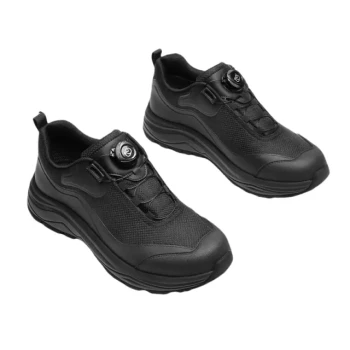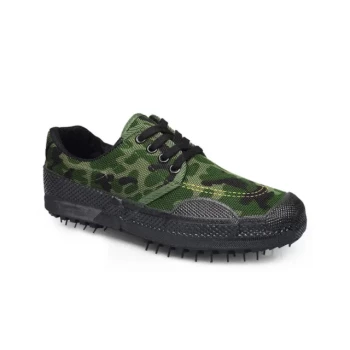Safety shoes are specialized protective equipment engineered to shield the foot from physical trauma, environmental extremes, and invisible workplace hazards. Specifically, they are designed to prevent injuries caused by heavy falling objects, punctures from sharp debris, electrical shocks, slip-and-fall accidents, and burns from chemicals or molten materials.
While commonly associated with impact protection, effective safety footwear functions as a comprehensive defense system, matching specific materials like leather or neoprene to the distinct risks of your environment.

Physical and Mechanical Defense
Impact and Compression Protection
The most recognized function of safety shoes is protecting the toes and bones of the foot.
They safeguard against falling objects or heavy equipment that could crush the foot. This is a primary requirement in construction, manufacturing, and logistics sectors.
Puncture and Cut Resistance
Work environments are often littered with sharp risks, such as nails, glass, or scrap metal.
Safety shoes frequently feature anti-perforation midsoles or reinforced soles. These prevent sharp items from piercing through the bottom of the shoe and injuring the foot.
Traction and Stability
Slips and trips are among the most common workplace accidents.
Safety footwear is designed with specialized tread patterns and materials to grip wet or slippery surfaces. By stabilizing the wearer, these shoes prevent falls on oily floors or uneven terrain.
Environmental and Chemical Barriers
Chemical and Corrosive Resistance
In laboratories and industrial cleaning settings, liquid hazards pose a severe threat.
Shoes utilizing specialized materials like rubber or neoprene provide an impermeable layer against harmful substances. This design prevents immediate chemical burns and shields the wearer from chronic health complications associated with absorbing toxins through the skin.
Thermal Protection
Extreme temperatures require robust material choices to maintain safety.
Leather safety shoes are particularly effective against burn injuries caused by fire, combustible agents, or molten metal spills. Conversely, insulated footwear protects against frostbite in cold storage or winter conditions.
Electrical Hazard Management
Safety shoes play a critical role in managing electricity, though the application varies by goal.
Some footwear is conductive or static-dissipative (ESD), designed to prevent static buildup that could damage sensitive electronic components. Other styles are insulated to stop the flow of electricity, protecting the wearer from shocks when working near live electrical sources.
Understanding the Trade-offs
Protection vs. Mobility
Heavy-duty protection often comes with added weight.
Shoes designed for maximum impact resistance (like traditional steel toes) can cause fatigue over long shifts. Lighter composite materials offer protection but may differ in cost or durability profiles.
Impermeability vs. Breathability
Materials that offer the best chemical resistance often reduce airflow.
Footwear made of thick rubber or neoprene is excellent for stopping corrosive chemicals, but it can trap heat and moisture. This can lead to discomfort or fungal issues if not managed with proper socks and hygiene breaks.
Making the Right Choice for Your Goal
Selecting safety shoes is not about finding the "strongest" shoe, but the one most aligned with your specific daily risks.
- If your primary focus is Heavy Industry or Construction: Prioritize impact resistance and anti-perforation soles to handle falling debris and sharp objects.
- If your primary focus is Electronics Manufacturing: Look for Electrostatic Discharge (ESD) footwear to protect sensitive components from static electricity.
- If your primary focus is Chemical Handling: Choose footwear with rubber or neoprene soles to create an impermeable barrier against corrosive spills.
- If your primary focus is Electrical Maintenance: Ensure your footwear is rated for electrical hazard protection (non-conductive) to shield you from live currents.
True safety is achieved when your equipment is perfectly matched to your environment.
Summary Table:
| Hazard Type | Primary Protection Feature | Common Work Environments |
|---|---|---|
| Impact & Compression | Reinforced toe cap (steel/composite) | Construction, Manufacturing, Warehousing |
| Punctures & Cuts | Anti-perforation midsole | Construction, Demolition, Metalworking |
| Slips & Falls | Specialized slip-resistant outsoles | Food Service, Healthcare, Mechanics |
| Chemicals & Corrosives | Impermeable materials (rubber, neoprene) | Laboratories, Cleaning, Chemical Plants |
| Electrical Hazards | EH (Electrical Hazard) or ESD (Static Dissipative) rating | Electrical Work, Electronics Manufacturing |
| Extreme Temperatures | Insulated or heat-resistant materials | Foundries, Cold Storage, Welding |
Protect Your Workforce with the Right Safety Footwear
As a large-scale manufacturer, 3515 produces a comprehensive range of safety shoes and boots for distributors, brand owners, and bulk clients. Our production capabilities encompass all types of protective footwear, ensuring your team has the precise defense they need against workplace hazards.
We help you:
- Mitigate Risk: Reduce workplace injuries with footwear tailored to your specific industry hazards.
- Boost Productivity: Enhance worker comfort and confidence with durable, purpose-built shoes.
- Streamline Procurement: Get reliable, high-volume supply of certified safety footwear.
Ready to equip your team with superior protection? Contact 3515 today for a consultation and let us help you specify the perfect safety footwear solution.
Visual Guide
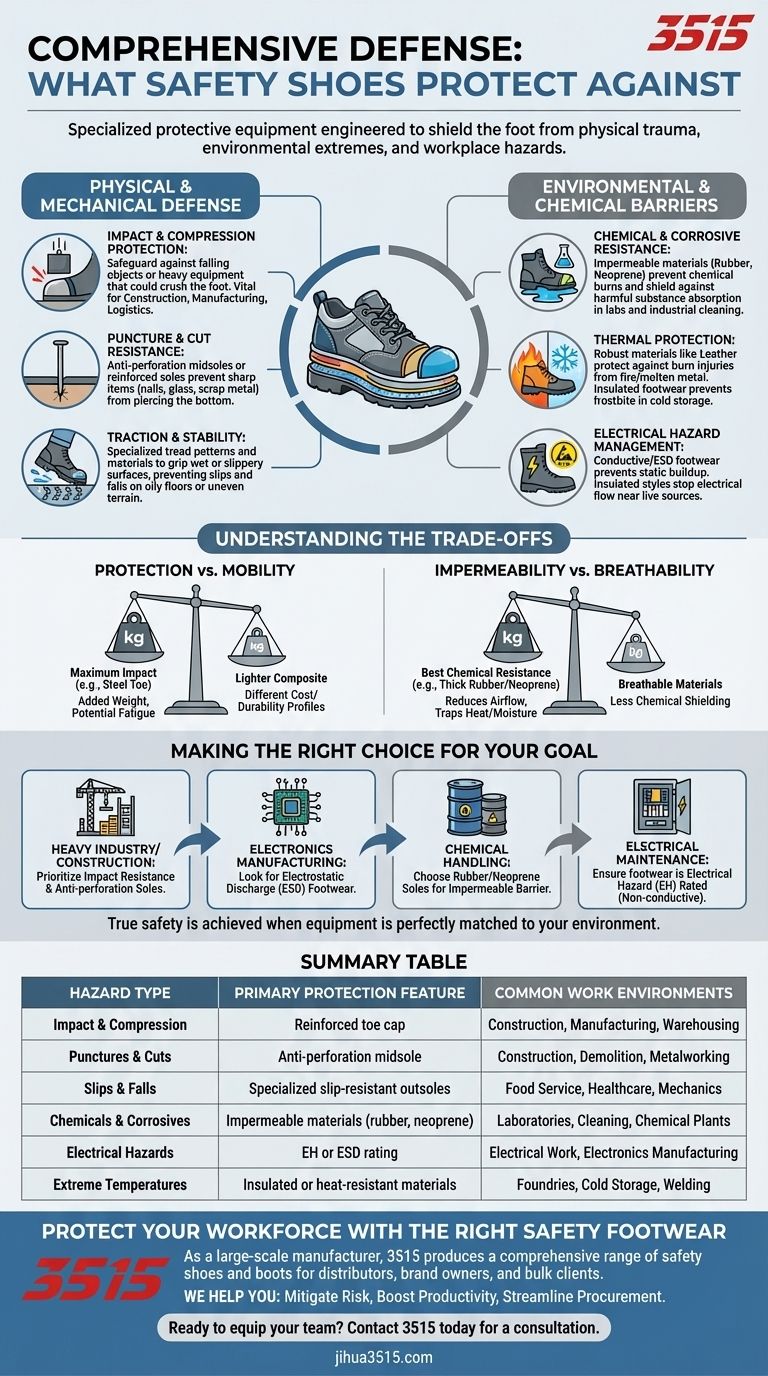
Related Products
- Custom Safety Shoe Manufacturer for Wholesale & OEM Brands
- Premium KPU Athletic Safety Shoes for Wholesale
- Premium Lightweight Safety Shoes for Wholesale & Bulk Orders
- Wholesale Durable Breathable Safety Boots Custom OEM Manufacturer
- Wholesale Leather Safety Boots with Customizable Protective Toe
People Also Ask
- What is the safety toe cap and what materials is it made from? Choose Steel or Composite for Your Job
- What are the protective advantages of professional safety shoes? Crucial Safety for Fiber Extraction and Finishing
- What is the primary function of protective footwear in poultry biosecurity? Maximize Flock Health and Biosecurity
- What features should women look for in safety boots for construction work? Essential Protection & Fit Guide
- What are the benefits of providing appropriate footwear for employees? Boost Safety, Productivity & Morale
- What are the benefits of providing school shoes with safety-grade durability? Ensure Long-Lasting Social Impact
- Which organization's standards are currently used for safety shoes? Ensure Your Footwear Meets ASTM F2413
- What are the benefits of athletic-style work shoes? Boost Comfort and Safety for Your Team
